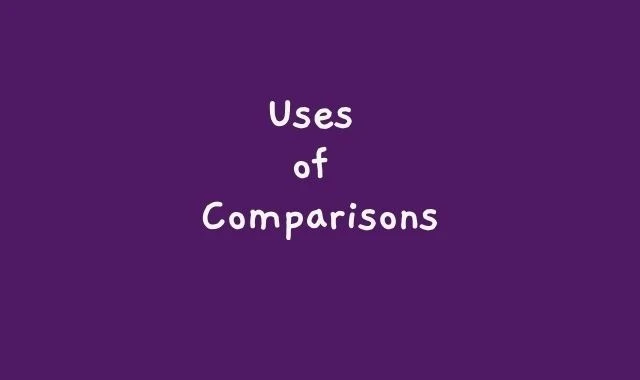Uses of Comparisons
Comparative and Superlative Forms
Use the comparative degree when comparing two things.
Use the superlative degree when comparing more than two things.
Use the superlative degree when comparing more than two things.
COMPARATIVE
- Both Pamela and Craig gave speeches in history class. Pamela’s speech was more interesting. [Two speeches are being compared.]
SUPERLATIVE
- Of all the speeches in history class, Pamela’s speech was most interesting. [More than two speeches are being compared. Pamela’s speech is being compared to all of the speeches given in history class.]
Include the word other or else when you are comparing one member of a group with the rest of the group.
ILLOGICAL
- Pamela worked harder than any student in the class. [Pamela is a student in the class. Logically, Pamela cannot have worked harder than herself.]
LOGICAL
- Pamela worked harder than any other student in the class. [One member of a group is being compared with the rest of the group, so the word other is used.]
NOTE
When comparing one member of a group to each of the other members, use the comparative form. When comparing one member of a group to all of the members of the group, use the superlative form.
COMPARATIVE
- Leo swam faster than the other members of the team, Carl, Nina, and Ashley. [Leo is being compared to each of the other members of the team. He swam faster than Carl, he swam faster than Nina, and he swam faster than Ashley.]
SUPERLATIVE
- Leo is the fastest swimmer on the team. [Leo is being compared to all of the members of the group.]
<->
Double Comparisons
Avoid using double comparisons.
A double comparison occurs when two comparative forms (usually –er and more) are used together or when two superlative forms (usually –est and most) are used together.
NONSTANDARD
- The curtains for the kitchen window should be more shorter than those for the dining room window. [More shorter is a double comparison.]
STANDARD
- The curtains for the kitchen window should be shorter than those for the dining room window. [Shorter is the correct comparative form.]
NONSTANDARD
- A cheetah can run more faster than any other land animal. [More faster is a double comparison.]
STANDARD
- A cheetah can run faster than any other land animal. [Faster is the correct comparative form.]
Comparatives and Superlatives Quiz
FAQs
What is the importance of comparison?
Comparison is crucial because it helps us understand and evaluate the similarities and differences between things. In educational contexts, comparison aids in critical thinking and decision-making. In daily life, it allows people to make informed choices by evaluating options based on various attributes. It also plays a significant role in scientific research and data analysis, where comparisons determine trends, causations, and effects.
What are the uses of comparatives?
Comparatives are used in language to express differences between two objects or concepts. They help in making quantitative and qualitative assessments clearer and more precise. For example, comparatives are used in statements like "This book is better than that one," which helps in conveying preferences, performances, and qualities efficiently. They are essential for descriptions, critiques, and everyday decisions.
What are some examples of comparisons?
Examples of comparisons include:
- Quantitative: "He is taller than she is."
- Qualitative: "This version of the software is more user-friendly than the previous one."
- Evaluative: "Studying at night is more effective for me than studying in the morning."
These comparisons can be seen across various contexts from daily conversation to academic discussions.
What is the point of comparison?
The point of comparison refers to the basis on which two or more entities are compared. It aims to highlight specific attributes or qualities that are measured against one another to elucidate differences or similarities. The point of comparison is fundamental in forming a structured argument or analysis and ensures that the comparison is meaningful and relevant to the discussion at hand.


